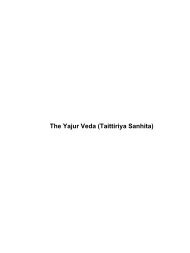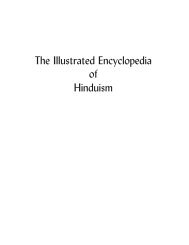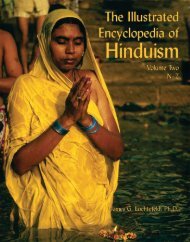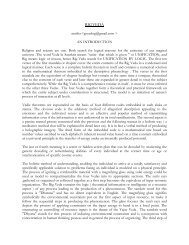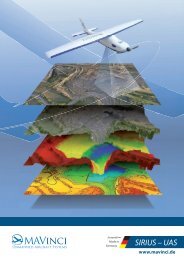A Concise Encyclopedia of Hinduism Klaus K Klostermaie
Create successful ePaper yourself
Turn your PDF publications into a flip-book with our unique Google optimized e-Paper software.
L<br />
lak•aæa<br />
In logic, implication.<br />
(‘mark’, ‘characteristic’)<br />
Lak•maæa<br />
Son <strong>of</strong> King DAŸARATHA by his wife<br />
Sumiträ, twin brother <strong>of</strong> ŸATRUGHNA<br />
and half-brother <strong>of</strong> RÄMA. He married<br />
Ürmilä, sister <strong>of</strong> Sïtä. He was very<br />
attached to Räma and Sïtä and accompanied<br />
them on their 14-year forest<br />
exile. He is seen as ideal <strong>of</strong> brotherly<br />
love and loyalty. (See also RÄMÄYAŒA.)<br />
Lak•mï, also Ÿrï, Tiru<br />
(‘good fortune’)<br />
Personified as the goddess <strong>of</strong> fortune,<br />
wife <strong>of</strong> Vi•æu and mother <strong>of</strong> KÄMA. She<br />
sprang fully developed from the sea at<br />
the time <strong>of</strong> the CHURNING OF THE OCEAN<br />
with a lotus in her hand. She is represented<br />
as having four arms.<br />
Lakulin, also Lakuli•a<br />
(second century CE)<br />
Legendary founder <strong>of</strong> the PÄŸUPATA<br />
system, a school <strong>of</strong> Ÿaivism.<br />
Lalla, or Lal Ded (14th century)<br />
A Ÿaivite woman poet and spiritual<br />
teacher from Käshmïr, whose verses<br />
have been published under the title<br />
Lalla-väkyäæi. She advocated openness<br />
for all schools <strong>of</strong> thought and religion<br />
and rejected ritualism and IMAGE worship.<br />
She taught that the way to salvation<br />
was the disinterested performance<br />
<strong>of</strong> one’s duties.<br />
language<br />
Language was always very important to<br />
Hindus, and their greatest cultural<br />
achievement is in the area <strong>of</strong> language.<br />
The Veda exhibits great respect for language<br />
and treats it as a divine being<br />
from which everything originated. The<br />
extraordinary care with which the Veda<br />
was preserved and transmitted over<br />
thousands <strong>of</strong> years again shows how<br />
greatly language was valued. According<br />
to Hindu tradition Sanskrit, their sacred<br />
language, the ‘language <strong>of</strong> the gods’, is<br />
eternal. In the course <strong>of</strong> time Hindus<br />
developed a variety <strong>of</strong> theories concerning<br />
the nature <strong>of</strong> language. One <strong>of</strong> the<br />
early controversies concerned the question<br />
whether words (päda) or sentences<br />
(väkya) were the basic elements <strong>of</strong> language.<br />
The early interest in grammar<br />
and etymology, as shown by the<br />
VEDÄ¢GAS and later scholarly works,<br />
again exhibits a religious concern with<br />
language. A proper study <strong>of</strong> language<br />
was considered the preliminary to all<br />
other disciplines. Cultivation <strong>of</strong> language<br />
skills was always considered the<br />
highest aim <strong>of</strong> education.




